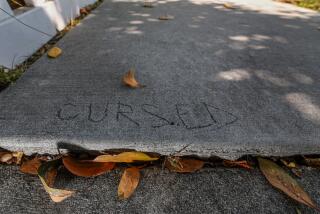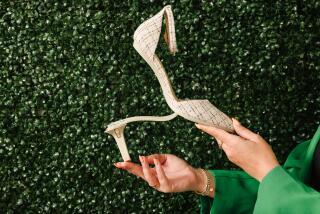L.A. Gear Moves to Protect Its Brats Shoe Patent : Design battle: Fat-tongued sneaker being sold by L.A. Gear and small shoe company are too similar, lawsuit says. A settlement may be near.
SUN VALLEY — Like any inventor, L.A. Gear feels strongly about its creations.
So the thriving Marina del Rey athletic shoe company was pleased when it was awarded design patent 300,181 by the federal government last March to protect an important step forward in its business: the Brats shoe, a sneaker with a tongue so fat that the shoe always looks fashionably untied.
It was a big deal for L.A. Gear, and maybe for teen-agers who once had to trip on their laces in pursuit of the untied-shoelace style. “The design of the Brats shoe is novel and distinctive,” the company argued in a recent legal filing, going on to describe the shoe’s “exaggerated, peekaboo tongue with a wraparound Velcro strap.”
It might not be the blueprints to the Stealth bomber, but L.A. Gear is serious about protecting its patent. So serious, in fact, that the company filed suit Jan. 4 in U.S. District Court in Los Angeles against a small Sun Valley store chain called Shoes Here for selling sneakers that allegedly infringed on the Brats’ design patent.
Shoes Here’s owner, former scrap-metal dealer Steven Warkel, denied the infringement charge but said he wants to settle out of court with L.A. Gear as fast as he can. Such a resolution looks possible, since Warkel’s attorney, Leonard Fertman, said last week that he was in negotiations with L.A. Gear about a settlement.
Warkel is eager not to have the possibility of a protracted court fight hanging over his head. Shoes Here is a modest retail enterprise that sells about $4.5 million a year in shoes and clothes out of two stores in the San Fernando Valley; L.A. Gear, meanwhile, did more than $600 million in sales worldwide in 1989.
Shoes Here’s troubles with L.A. Gear had their origin in the fall or late summer of 1988 when Warkel struck a deal with a South Korean supplier to produce a cheap line of fashion sneakers that he sold under the E=QUL brand name. Warkel thought it was a chance to start selling his own modest label of sneakers to other retailers, in addition to selling them at his own stores along with Nike, Avia, L.A. Gear and assorted other big-name sneaker brands.
In a spare back room of his warehouse-style Sun Valley store, where long rows of shoes are lined up in boxes for sale, Warkel said his bank is worried about Shoes Here’s potential liability in the lawsuit and wants to wait until the case is over before giving him a $500,000 loan to expand his store.
“They know they can break me,” said Warkel of L.A. Gear.
Until recently L.A. Gear’s attorneys were talking tough. They said the company, whose fashions are influential in the shoe business, wants an injunction to prevent Shoes Here from selling any more E=QUL sneakers. And L.A. Gear said it wants all of the profits that the Sun Valley company made on the E=QUL sales, plus damages and attorneys’ fees.
Warkel admitted that his E=QUL shoes are pretty similar to L.A. Gear’s. “I mean, how different can a shoe be?” he asked.
But Warkel pointed out that L.A. Gear got its Brats patent in March, 1989, well after he imported 4,000 pairs of E=QULs in September, 1988. And in any case, Warkel says, he stopped selling the shoes last May--shortly after L.A. Gear complained in a letter that the E=QUL model violated its Brats patent.
L.A. Gear counters that it found the shoes for sale in this country and Europe as recently as November.
Warkel said that he sold most of the E=QULs at a loss in Mexico after he heard from L.A. Gear and that he didn’t make any profit on the whole affair.
For L.A. Gear, the case is a matter of protecting what the company claims is an artistic first in the shoe business. L.A. Gear’s lawsuit says Brats are unique because they combine the untied look with other fashion features, such as “an embossed speckled leather fichu collar with a slide stripe and color coordinated piping intersected by a saddle row; and a color coordinated satin stripe bonex mustache.”
A frivolous claim for a patent? “Fashion, to some people, is frivolous,” said Frank Hiscox, L.A. Gear patent counsel.
But that’s really what design patents are about, said patent expert Michael Blommer, executive director of the American Intellectual Property Assn. near Washington.
“There are patents on Hula-Hoops,” Blommer said. “In the shoe design business, this is big-time stuff.”
Warkel, however, doesn’t buy the idea that a mere athletic shoe can be so distinctive it deserves a patent. And, he said, in practice most shoemakers don’t buy it either.
Warkel recently paced in his Sun Valley shop and pointed out what he said are knockoff shoe designs. “This is a cross between a Reebok and a Nike,” he said of a low-top tennis shoe by Ocean Pacific. He moved down the aisles, and his eyes came to rest on an L.A. Gear shoe with curly leather ribbons sewn on the sides. “They copied that from Giorgio Brutini,” he said with satisfaction.
L.A. Gear probably knows a thing or two about copying shoe styles because in 1988 a federal appeals court judge found that L.A. Gear knocked off the Model 750 tennis shoe made by rival Avia.
Ironically, L.A. Gear’s defense in its Avia case could be the pattern for Shoes Here’s defense if the case ever goes to trial.
L.A. Gear said Avia shouldn’t have been allowed to patent its design for the 750 shoe because it was functional, not ornamental, and the design wasn’t unique. In fact, L.A. Gear argued that the design was so unoriginal as to be obvious to anyone designing athletic shoes. And as Warkel has already said about his own case, L.A. Gear argued that it imported its Avia-like Boy’s Thrasher shoes before Avia had patented its sneaker.
But a federal appeals judge found that L.A. Gear did violate Avia’s patent, and the company settled with Avia for $425,000.
Back in 1988, a representative of Sung-Won International, a South Korean shoe manufacturer, stopped by Shoes Here on the way home from a trade show in New York and showed Warkel some sneakers he could make cheaply. The Sung-Won salesman said Warkel could put any name he wanted on the shoes.
Warkel was looking to offer inexpensive but trendy shoes. He picked a couple of styles--some E=QULs and the rest, in Warkel’s words, “just regular sneakers, with no lawsuits.” He bought the E=QULs for about $12 a pair and would sell them for about $25. Warkel said he didn’t know his own shoe looked so much like the $50-a-pair Brats shoe, which is also made in Korea. But Warkel said he was sure Sung-Won officials had seen the Brats in Korea.
Much of the suit boils down to the shoes L.A. Gear said it found for sale long after Warkel said he stopped selling them. Fertman said Warkel had given the names of the outlets to L.A. Gear and is not to blame for those sales.
Warkel said he doesn’t want a long fight with L.A. Gear that could jeopardize his relationship with the company. Warkel said he buys about $1 million worth of L.A. Gear shoes a year for his store. “I’m going to settle with them,” he said. “What else can I do?”
But even though such a settlement may be possible, Warkel said, the suit has had an effect.
Once, he was determined to sell his own line of high-fashion, low-cost shoes such as the E=QUL. Now, he admitted, the idea has “kind of soured on me.”
More to Read
Inside the business of entertainment
The Wide Shot brings you news, analysis and insights on everything from streaming wars to production — and what it all means for the future.
You may occasionally receive promotional content from the Los Angeles Times.










